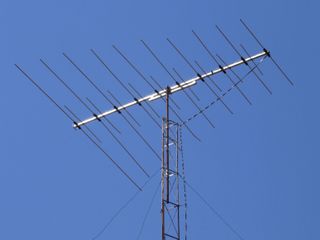Ofcom to turn TV white space into mobile broadband?
New ways of leveraging signal

The white spaces between TV channels could be used to expand mobile broadband in rural areas or even revolutionise the communications between gadgets and computers, according to Ofcom.
The communications regulator is looking into how white space can be utilised, in a bid to squeeze as much as possible out of the UK's TV spectrum.
The idea is that by accessing and leveraging this white space, broadband signals could be increased in the more remote areas of the country and there's even room to use the frequencies as a Bluetooth-like transfer system, so those with cameras can instantly send images to enabled PCs or white goods devices in the home which could be controlled from a distance.
Unproven technology
These ideas all come from Professor William Webb, the Head of Research and Development at Ofcom.
"White space devices have the potential to enable a vast range of new and innovative applications - from broadband access for rural communities, to innovative personal consumer applications - each benefiting from improved signal reliability, capacity, and range offered by unused TV frequencies," explained Webb about the white space plan.
There's no timeframe for when or indeed if any of these ideas will be implemented, with Webb saying: "This technology remains largely unproven and a significant amount of work needs to be done before these claims can be tested.
Get daily insight, inspiration and deals in your inbox
Get the hottest deals available in your inbox plus news, reviews, opinion, analysis and more from the TechRadar team.
"The purpose of this discussion document is to further the thinking that is taking place around the world on geolocation and speed the development of possible solutions."
Last year the Federal Communications Commission (FCC) in the US approved the operation of white-spaces devices in the unused TV spectrum.
There are some who are against the idea, however, citing that the use of white space causes interference in everything from TV stations to the microphones at live events.
Marc Chacksfield is the Editor In Chief, Shortlist.com at DC Thomson. He started out life as a movie writer for numerous (now defunct) magazines and soon found himself online - editing a gaggle of gadget sites, including TechRadar, Digital Camera World and Tom's Guide UK. At Shortlist you'll find him mostly writing about movies and tech, so no change there then.

